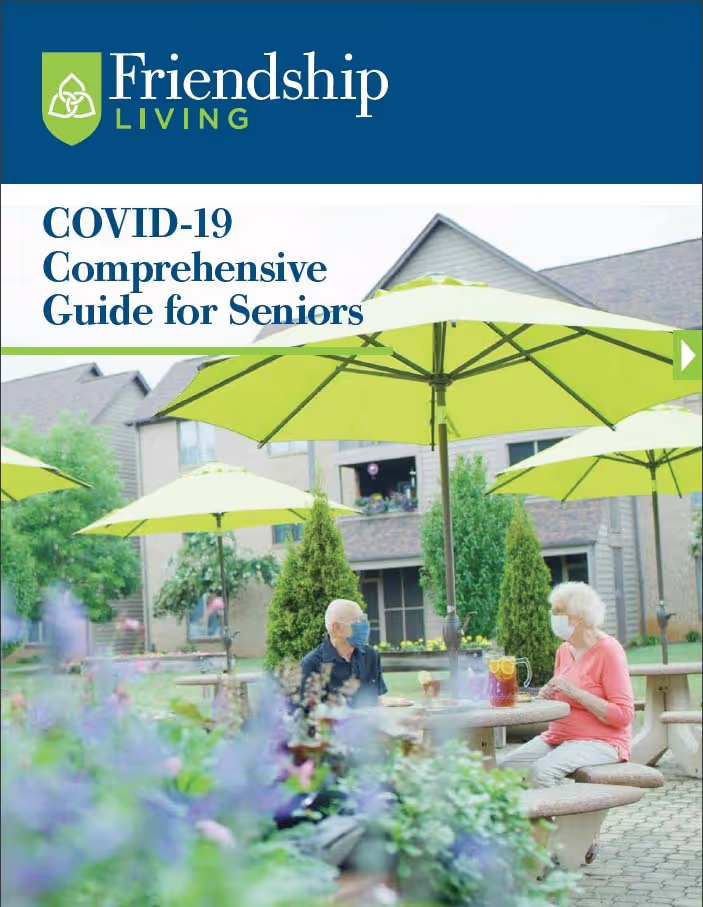-5.jpeg)
COVID-19 Stress and Seniors: 10 Ways to Protect Your State-of-Mind
-5.jpeg)
This year will likely go down as one of the most stressful ever thanks to the COVID-19 pandemic. We’ve all felt the fear and uncertainty, but for those in high-risk categories like seniors, the stress is even more heightened. Yet at the same time, seniors are also more susceptible to the health risks that prolonged stress creates. What can you do? Here are some tips to help protect your state-of-mind.
Common Stressors During COVID-19
First, let’s talk about what’s causing the stress. There are almost too many stressors to count, but right now it’s normal for you to have feelings that include:
● Fear of running out of essentials
● Anxiety about being separated from loved ones
● Uncertainty about how long you’ll have to isolate at home
● Fear of getting sick and/or your loved ones getting sick
● Guilt over not being able to fulfill responsibilities, like work or caring for loved ones
● Boredom or isolation
● Thoughts of blame, worry or fear
● Worry about financial strain
● Fear of being stigmatized you become sick
The Dangers of Stress for Seniors
Prolonged stress certainly isn’t ideal for anyone, but seniors can be particularly vulnerable to the health issues it can cause including:
● High blood pressure
● Increased risk for heart disease
● Weakened immune system
● Anxiety and/or depression
● Insomnia
● Poor concentration
● Heartburn and/or indigestion
How to Handle Stress
It’s important to tackle your feelings of stress head-on instead of brushing them under the rug, hoping they will go away on their own. Spoiler: they typically won’t unfortunately. Instead, follow these tips before you become overwhelmed.
1. Stay Connected – Even if you can’t be together physically, you can still call or FaceTime. Strive to connect with at least one friend or loved one daily. And make sure you talk about your feelings and concerns with those you trust.
2. Know the Facts – Misinformation and fear mongering is rampant now, so make sure your information is coming from accurate, reliable sources. And take breaks from news stories and social media every so often!
3. Practice Good Health Habits – Your mental health is closely tied to your physical health so don’t forget to continue to eat nutritious meals, drink plenty of water and get enough sleep.
4. Get Physical – Exercise releases endorphins which can improve your mood so stay as active as you can while maintaining social distancing. For example, walk your pet around the neighborhood or try some low-impact aerobics videos online.
5. Relax – Easier said than done right? But we’re talking about activities that can help put you in a more relaxed state such as taking deep breaths, meditating and/or even doing activities you enjoy like gardening or other hobbies.
6. Get Spiritual – Whether it’s following practices at home that provide your comfort and/or connecting online with your faith-based community. This can help keep you grounded and may allow you to see the situation in a broader context.
7. Think Positive – There’s a freedom that comes with accepting what you can’t control and focusing on what you can. Perhaps a ‘good day’ may not look exactly like it used to but you can adjust your definition to find the positives in this new normal. And celebrate successes, even small ones.
8. Be Patient – We could likely all do a little better with patience, towards ourselves and others. In such a frustrating time, actively looking for opportunities to be patient and kind can really lift the spirits.
9. Make a Plan – If you do have to go out, learn when and where you’ll have the least risk. Also plan what to do if you believe you may have COVID-19 such as when to call your doctor, when to get a test and/or when to quarantine.
10. Protect Yourself – Knowing you’re doing all you can to reduce your risk can also reduce your stress so continue to follow best practices for hand washing, staying home when sick, avoiding contact with those who are sick and cleaning and disinfecting surfaces.
However, you should call your healthcare provider if stress gets in the way of your daily activities for several days in a row. Or, get immediate help if you are in crisis by calling 911 or the National Suicide Prevention Lifeline at 1-800-273-TALK (8255).
Help Your State-of-Mind in Independent Living
If you’re already stressed and feeling isolated, the tips above may seem like too much to take on alone. But you do have an alternative: independent living. In our communities, you’re never alone with caring staff, neighbors and friends nearby to be there for you during this time.
We are committed to helping residents continue to live their best lives with as little stress as possible. For example, you’ll have multiple ways to keep connected through technology such as Go To Meeting, as well as small group engagement opportunities. You’ll also be able to access to our onsite restaurant and bar as well as our pool, gym and salon because these are all located separate from resident living areas and allow us to maintain appropriate social distance.
Plus, you can rest assured we stringently adhere to the most recent local, state and federal guidelines for COVID-19. And everything you need is right here so you can avoid the risks of going out in public while never having to worry about out-of-stock necessities. Not to mention, our 24-hour staffing means we’re able to respond quickly to any potential symptoms or concerns.
For more information on independent living on our campus, contact us today at 540.385.8720 to schedule a tour!
Want additional "boredom busters" and tips as we navigate through this pandemic? Click here to access our free COVID-19 Guide!

